Meningitis and one family's road to recovery
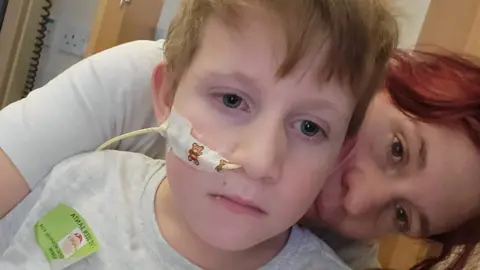 Becky
BeckyJust over a year ago Toby was a seven-year-old boy, running around and playing with his friends, but after suddenly contracting bacterial meningitis, he became paralysed, was unable to eat and lost the power of speech.
Following a year of intensive physiotherapy at Bristol children's hospital he is walking again and has been able to go to a new school in Swindon where he receives one-to-one support. His mother, Becky, wanted to tell his story to raise awareness about the disease.
"To hear him call me Mum again, and see him respond well [to treatment] has turned a horrible year into the best dream ever," Becky said.
On 11 November 2021, Toby was admitted to the Paediatric Intensive Care Unit (PICU) at Bristol Royal Hospital for Children.
He had been suffering with a high temperature for a couple of days, had complained of neck ache and was not eating.
Mother-of-five, Becky, from Pinehurst in Swindon, said she thought he had a stomach bug, but when he started experiencing seizures, she put him straight in a car and took him to A&E at the Great Western Hospital.
"I thought I was going to lose him," she said.
"He wasn't responding to me, his eyes weren't coordinating, it was like he was in his own world.
"I felt really scared, I didn't know what to do."
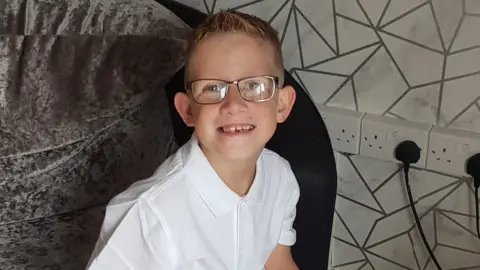 Becky
BeckyRealising he needed specialist care, Toby, who had been vaccinated against meningitis as a baby, was put to sleep and given oxygen. He was then transferred to Bristol.
He stayed on the intensive care unit for eight days and was diagnosed with bacterial meningitis - the most serious strain of the disease.
"Toby was unconscious for eight days," Becky said.
"I was lost. I couldn't communicate with him, all I could do was hold his hand.
"He was put on IVs to stop the meningitis from spreading even more."
Warning: Potentially distressing image below

What is meningitis?
- Meningitis is an infection that affects the protective membranes that surround the brain and the spinal cord
- Viral meningitis is the most common form of the disease and is the least serious. Although it can make people very unwell, it is rarely life-threatening
- Bacterial meningitis is very dangerous and can kill if it is not identified and treated quickly
- Bacterial meningitis can be caused by a number of different kinds of bacteria, including several types of meningococcal bacteria which cause the strains known as Men A, B, C, W, X, Y and Z
- Meningitis can affect anyone, though it is most common in babies, children and teenagers. The elderly and those with weakened immune systems (such as people receiving chemotherapy) are also at increased risk
- Common symptoms to look out for include: fever, vomiting, a severe headache, a dislike of bright lights, a stiff neck, confusion, being sleepy or unresponsive, seizures, a rash

After a week, Toby was woken up to see what the extent of any damage was.
"They said to me these are early days, he could be practically brain dead, so if he does survive he won't be able to do a lot, he may not be able to communicate," Becky said.
"The doctors didn't know how much his brain would be damaged.
"I had to learn about meningitis really quickly."
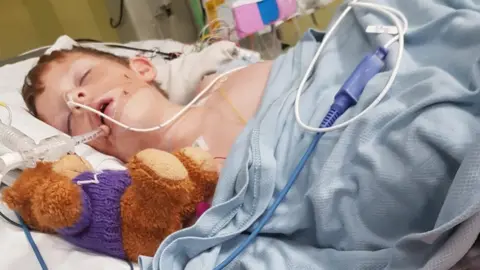 Becky
BeckyCharity Meningitis Now estimates that one in 10 children affected by bacterial meningitis will lose their lives to the disease.
Chief executive Dr Tom Nutt said: "Vaccines are available to prevent some types of meningitis but not all types can be prevented. That's why it's also vital to know the signs and symptoms.
"Meningitis symptoms can appear in any order. Some may not appear at all.
"If anybody you know has any of them get urgent medical help."
Becky believes that if Toby had not been vaccinated, he would have lost his life.
As it was, he lost the use of his left side and could not sit up, move his neck or limbs, and had to use a wheelchair and hoist.
After being woken from the coma, he was transferred to the hospital's high dependency ward, before spending five months on the neurosciences Bluebell ward.
"As soon as he came around, he was unable to speak," Becky said.
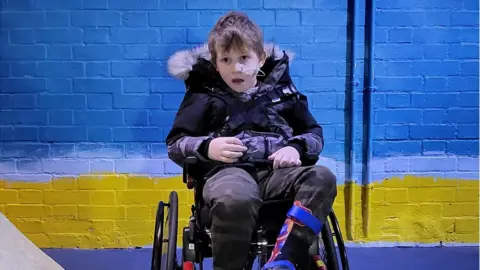 Becky
Becky"For the first few weeks, or months, it was so frustrating for him, he would hit out, because he couldn't talk.
"All of a sudden everything had stopped [for him]. He was crying all the time, it killed me. I didn't realise meningitis could do that."
Toby underwent a mixture of speech therapy, occupational therapy and physiotherapy to help him regain movement.
"It was just small steps of improvement. He would be put in a stand to help his brain work again, to know he has legs and can balance.
"He had leg splints to help keep the tension in his legs, and he had a wheelchair."
Becky stayed by his side throughout his inpatient stay and through every therapy session, while her partner looked after her three other children at home.
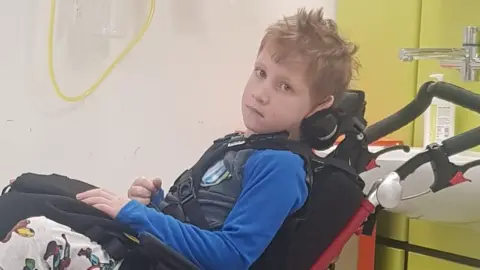 Becky
BeckyHe started to walk again in February 2022 and took his first steps on Becky's birthday, while on a weekend home visit.
"He had started to laugh again, giving us half a smile on his face, that was some of the first things he was doing, then saying 'Mum, Mum, Mum'," Becky said.
"And his first steps were on my birthday. It felt amazing, we were getting somewhere.
"I took him back to the hospital, and the girls couldn't believe it.
"I took him out of his chair and he started doing little steps, obviously guided by me, but everyone was so surprised.
"And he just started to get stronger after that."
Toby was eventually discharged in April with a care plan in place to help him live at home.
Becky, who was pregnant at the time, said she felt isolated and often anxious at times.
She was very worried about how Toby would recover as she was aware that recovery from meningitis can be very slow.
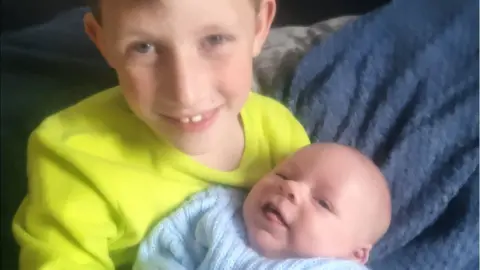 Becky
BeckyWhile there is still weakness on his left-hand side, Toby is back to being a cheeky eight-year-old boy, walking, running, eating and drinking, Becky said.
"We did it. It wasn't for me, it was all for him," she said.
"I'm really proud of him. You look at him now and wouldn't think what he has been through.
"He needs to get his speech back, but can listen to what I am saying and go and get it. But he is deaf in his right ear still and can't speak."
Toby has enrolled in a special school where he receives one-to-one care and he still attends regular therapy appointments, but he has surprised everyone with his progress and how far he has come.
"He loves going out to the park and playing football and soft play, all the sensory he gets there, and he loves his new baby brother," Becky said.
"The last few months, it is like he is coming back to his own age."
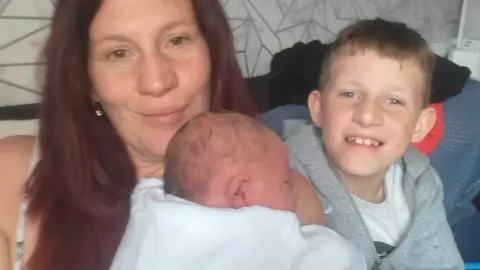 Becky
BeckyToby, who is still working on his speech, is likely to continue to have special educational needs, although Becky said it was hard to know exactly what the lasting effects might be.
Becky added: "Meningitis is terrible and can lead to a lot of damage and even loss of life. I didn't realise that [before this].
"I nearly lost him. I don't want any parent to go through what I went through.
"I can't thank all the nurses and doctors enough. Thank you for saving my son's life, I owe you everything."

Follow BBC West on Facebook, Twitter and Instagram. Send your story ideas to: [email protected]
